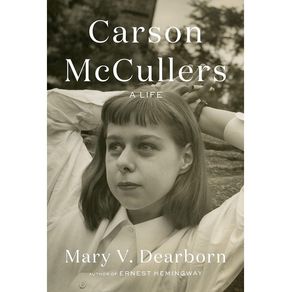V. S. Pritchett called her "a genius." Gore Vidal described her as a "beloved novelist of singular brilliance . . . Of all the Southern writers, she is the most apt to endure . . ." And Tennessee Williams said, "The only real writer the South ever turned out, was Carson."
She was born Lula Carson Smith in Columbus, Georgia. Her dream was to become a concert pianist, though she'd been writing since she was sixteen and the influence of music was evident throughout her work. As a child, she said she'd been "born a man." At twenty, she married Reeves McCullers, a fellow southerner, ex-soldier, and aspiring writer ("He was the best-looking man I had ever seen"). They had a fraught, tumultuous marriage lasting twelve years and ending with his suicide in 1953. Reeves was devoted to her and to her writing, and he envied her talent; she yearned for attention, mostly from women who admired her but rebuffed her sexually. Her first novel-- The Heart Is a Lonely Hunter--was published in 1940, when she was twenty-three, and overnight, Carson McCullers became the most widely talked about writer of the time.
While McCullers's literary stature continues to endure, her private life has remained enigmatic and largely unexamined. Now, with unprecedented access to the cache of materials that has surfaced in the past decade, Mary Dearborn gives us the first full picture of this brilliant, complex artist who was decades ahead of her time, a writer who understood--and captured--the heart and longing of the outcast.

